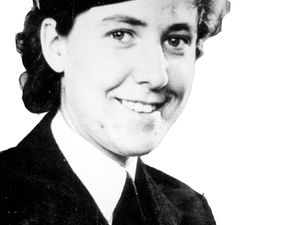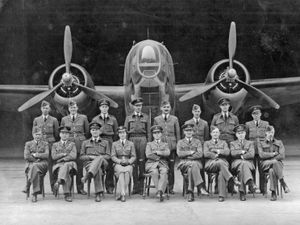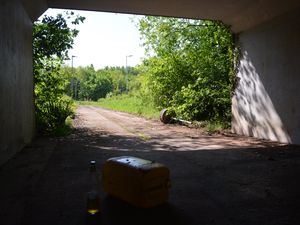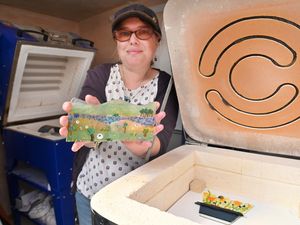Homeless people swap the streets for luxury Shrewsbury hotel
The 17th-century Prince Rupert Hotel normally caters for people enjoying a short break, often from the nearby towns and cities of the West Midlands.
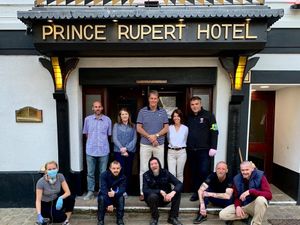
The county town of Shrewsbury is perfect for a visit, quaint and historic and with excellent shops and cafes.
But it too has a homeless problem, and now the Prince Rupert is stepping up to help in a time of need.
Hotel owner Mike Matthews has opened his doors for those who would otherwise be sofa-surfing or be on the streets.
For the past six weeks, the four-star Prince Rupert has been providing luxury accommodation for 25 people who were sleeping rough around Shrewsbury town centre.
More Covid-19 coverage:
People more used to bedding down in shop doorways now spend their nights in king-sized beds beneath wood-beamed ceilings, in an hotel which once hosted former prime minister Margaret Thatcher.
One of the guests, 35-year-old Jimmy, was a familiar face to Mr Matthews, although he struggled to remember where from.
"I recognised the face, but couldn't place where I had seen him before, I thought I must have seen him on the streets or somewhere," he says. Jimmy later revealed that nearly 20 years earlier, he had briefly served in the hotel kitchen as an agency worker.
Jimmy says: "I was at the path where I didn't know whether I wanted to be a chef or not. I worked here for a chef called Mick, he was a brilliant bloke."
Mr Matthews, who has kept the Prince Rupert for 26 years, says he was preparing to close the hotel for the lockdown when he received a call from Shropshire Council.
"I was working out what to do to close a hotel which hasn't been closed since the 12th century," he says.
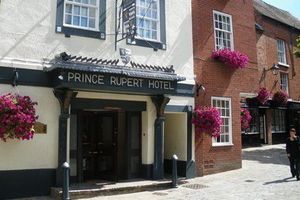
Like local authorities across the country, Shropshire Council had been told to find accommodation for all rough sleepers to prevent the spread of the pandemic.
Mr Matthews says he was immediately interested when asked to house the homeless people of Shrewsbury, but also wondered if there would be difficulties.
"I didn't want to stay at home," he says. "The thought of being in my back garden for two months didn't really appeal. We were talking about offering the hotel to the NHS, or one of the other services like the fire service or key workers, when the council called.
"My main concern was how do you stop them from leaving the hotel and returning to the streets, and then coming back into our building. I have a duty of care to my staff and my clients, and I didn't want to put them at risk."
Such fears proved unfounded, says Mr Matthews, with his new guests adhering obediently to the rules.
The other challenge has been in looking after people who have drug or alcohol addictions, although, again, Mr Matthews says it has not been a major problem.
"There has been only one occasion, when an individual who was coming off drugs, and she really needed some medication in the night," he says.
"Obviously we can't provide that, so we had to call an ambulance, and we had to bring in the police to assist her and take her to suitable accommodation. It wasn't her fault, it's just what can happen when you are dealing with an addiction."
Richard, one of the hotel's new guests, says the hospitality has made him able to enjoy a normal life once more.
"I don't feel like I have been homeless, I feel like I have got my life back," he says.
Mr Matthews, who has moved into the hotel to help look after his guests, says it was a culture shock for them when they were asked en masse to collect their belongings together and move into the hotel.
"It's hard to ask someone to leave the only life they have known for many years, they have become like one large family," he says.
"One guy had been doing it for over 44 years. The hard task was getting them to stay, to make sure they felt they were welcome, and to make sure they were integrated with each other, and with us."
Mr Matthews, who is 61, admits the experience has also changed his perception of homeless people.
"In the past I have been to meetings where people with businesses in the town talk, quite understandably, about how difficult it is when they arrive for work to fined people asleep in shop doorways," he says.
"Up until now, I had always seen it from the business point of view, but if you have got nowhere to sleep, and it is raining or winter, a shop doorway will provide you with some shelter."
He says many of his guests had skilled jobs before a change in circumstances forced them onto the streets.
"We have got two ex-chefs, one of which has offered to come in the kitchen and cover for us, to give us a night off," he says.
Guest Richard, he says, used to work as a furniture maker, and has been going around the hotel repairing all the faulty chairs.
"Homeless people have hopes and ambitions just like us," he says. "They may be small ones. Whereas you and I might hope to buy a house or a nice car, they hope it won't rain today, and if it does they will move to a different location."
Mr Matthews says he hopes the experience of staying in the hotel will help them turn their lives around.
"People need a structure in their lives, getting up, having breakfast, having a break and something else to eat, and then doing some more work," he says.
Mr Matthews says it is important to find the guests suitable accommodation when the lockdown ends, and says he might offer work to some of them.
Not everyone has been pleased with what he is doing though. One neighbour, in particular, has made a number of complaints about his guests standing around chatting in the hotel grounds.
"We are not going to please everyone doing this, this is just a fact of life," he says.
"If there was a wedding, and there were 10-15 people standing around outside, nobody would say anything. But 99.9 per cent of people understand what we are doing, and are supportive."

